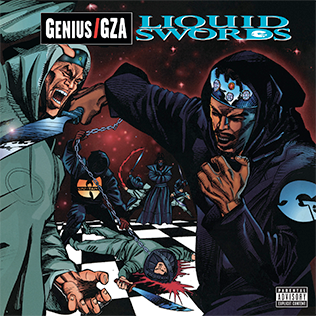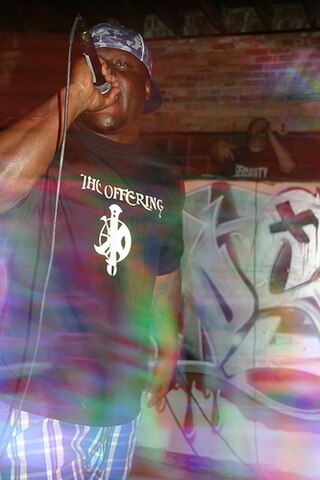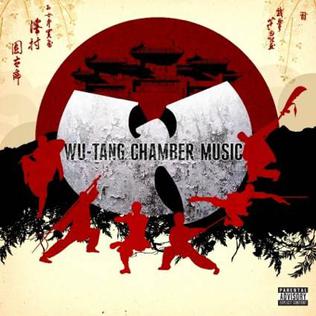Chamber music is a form of classical music written for a small group of instruments.
Contents
Chamber music may also refer to:
Chamber music is a form of classical music written for a small group of instruments.
Chamber music may also refer to:

Wu-Tang Clan is an American hip hop collective formed in Staten Island, New York City, in 1992. Its members include RZA, GZA, Method Man, Raekwon, Ghostface Killah, Inspectah Deck, U-God, Masta Killa, and, until his death in 2004, Ol' Dirty Bastard. Close affiliate Cappadonna later became an official member. They are credited for revitalizing East Coast hip hop and are considered one of the greatest hip hop groups of all time.

Russell Tyrone Jones, better known by his stage name Ol' Dirty Bastard, was an American rapper. He was one of the founding members of the Wu-Tang Clan, a rap group primarily from Staten Island, New York City, which rose to mainstream prominence with its 1993 debut album Enter the Wu-Tang .

Enter the Wu-Tang is the debut studio album by the American hip-hop group Wu-Tang Clan, released on November 9, 1993, by Loud Records and RCA Records. Recording sessions took place during late 1992 to early 1993 at Firehouse Studio in New York City, and the album was produced by the group's de facto leader RZA. Its title originates from the martial arts films Enter the Dragon (1973) and The 36th Chamber of Shaolin (1978).

Liquid Swords is the second solo studio album by the American rapper and Wu-Tang Clan member GZA, released on November 7, 1995, by Geffen Records. Recording sessions for the album began midway through 1995 at producer RZA's basement studio in the New York City borough of Staten Island. The album heavily samples dialogue from the martial arts film Shogun Assassin and maintains a dark atmosphere throughout, incorporating lyrical references to chess, crime and philosophy. Liquid Swords features numerous guest appearances from the other eight members of Wu-Tang Clan along with Wu-Tang affiliate Killah Priest.

Jason Richard Hunter, better known by his stage name Inspectah Deck, is an American rapper and hip hop producer. He is a member of the groups Wu-Tang Clan and Czarface.
Conclusion may refer to:

Ludovico Maria Enrico Einaudi OMRI is an Italian pianist and composer. Trained at the Conservatorio Verdi in Milan, Einaudi began his career as a classical composer, later incorporating other styles and genres such as pop, rock, folk, and world music.

Walter Reed, better known by his stage name Killah Priest, is an American rapper, member of Sunz of Man and Wu-Tang Clan affiliate who was raised in Brooklyn, New York. He is known for his intensely spiritual lyrics, containing religious references and metaphors. He is connected to the Black Hebrew Israelites through his rhymes, and is known for his controversial and political subject matter. He is also a part of supergroup the HRSMN along with Canibus, Ras Kass, and Kurupt.

"C.R.E.A.M." is a song by the American hardcore hip hop group Wu-Tang Clan, released on January 31, 1994 by Loud Records, as the second single from their debut studio album Enter the Wu-Tang (1993). The song was produced by the group's de facto leader RZA, and contains a sample of the Charmels' 1967 song "As Long As I've Got You" throughout. It features two verses from members Raekwon and Inspectah Deck, who discuss their upbringings while living in New York City, and Method Man, who sings its hook. Its music video, featuring all Wu-Tang Clan members in New York City, was released in 1994.
Impossible, Imposible or Impossibles may refer to:

Ballaké Sissoko is a Malian player of the kora. He has worked with Toumani Diabaté and Taj Mahal, and is a member of the group 3MA with Driss El Maloumi and Rajery.

Wu-Tang Chamber Music is a compilation album endorsed by Wu-Tang Clan, which was released through E1 Music/Universal Records on June 30, 2009. The album features performances by several Wu-Tang members and affiliates. The album was released to positive reviews from music critics. This album was followed up with the 2011 compilation album Legendary Weapons.
Chamber Music is an album by Ballaké Sissoko and Vincent Segal. It was released in 2009 by the French label No Format! and in 2011 by the U.S. label Six Degrees Records. The result of a close collaboration between the two friends and musicians, it melds Sissoko's traditional kora playing with Segal's trip hop infused approach to the classical cello.
No Format! is an independent record label based in Paris founded in 2004 by Laurent Bizot, later joined in 2007 by Thibaut Mullings.

Vincent Ségal is a French cellist and bassist.

A Better Tomorrow is the sixth studio album by American hip hop group Wu-Tang Clan. The album was released on December 2, 2014, by Warner Bros. Records. The album was supported by the singles "Keep Watch", "Ron O'Neal" and "Ruckus in B Minor". A Better Tomorrow received generally mixed reviews from music critics. The album debuted at number 29 on the Billboard 200 chart, selling 24,386 copies in its first week of release.

Robert Fitzgerald Diggs, better known by his stage name RZA, is an American rapper, record producer, composer, actor, and filmmaker. He is the de facto leader of the hip hop group Wu-Tang Clan, having produced most albums for the group and its respective members. He is a cousin of two other original Wu-Tang Clan members: GZA and Ol' Dirty Bastard. He has also released solo albums under the alter-ego Bobby Digital, along with executive producing credits for side projects. After forming the Wu-Tang Clan, RZA was a founding member of the horrorcore group Gravediggaz, since 1992, where he went by the name The RZArector.

Jamel Irief, better known by his stage name Masta Killa, is an American rapper and member of the Wu-Tang Clan. Though one of the lesser-known members of the group, he has been prolific on Clan group albums and solo projects since the mid-1990s. He released his debut album No Said Date in 2004 to positive reviews, and has since released three additional albums.

New Ancient Strings is a studio album by the Malian musicians Toumani Diabaté and Ballaké Sissoko, released on 22 June 1999 by the British label Hannibal Records. The album comprises eight instrumental duets composed by Diabaté for kora, a stringed instrument of West African music. Diabaté and Sissoko are esteemed as the best and the second-best kora players of their generation, respectively. Their duets were recorded in a single live take within a marble hallway of Bamako's conference centre on the night of 22 September 1997, coinciding with Mali's Independence Day.